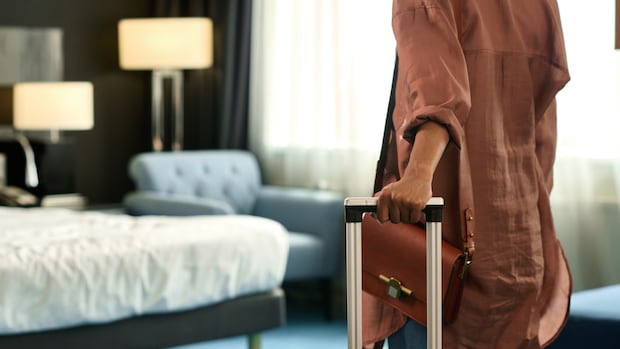
Cost of LivingWhy more hotels are renting by the hour
And we’re not talking about “no tell motels.” Thanks to apps like DayUse and Byhours, a growing number of hotels are opening their doors to people who’ll pay for a few hours by the pool and an afternoon nap. Producer Blair Sanderson explains how it works.
Rea Kappler of Winnipeg was excited to take a break from everyday life with a sunny, relaxing vacation in Colombia.
But thanks to a bad winter storm and a missed connection, she found herself stranded at Toronto Pearson International Airport. Not so relaxing, and definitely not sunny.
“It’s so uncomfortable at the airport. Like, there’s a lot of delayed and cancelled flights, so a lot people are in the airport at that time,” Kappler told Cost of Living.
That’s when her husband, who had left earlier and already reached their destination, suggested booking a hotel room for a few hours in the afternoon while she waited for her evening flight.
She had never heard of renting a hotel room without an overnight stay before, but decided to try it. She was able to book a room at the Holiday Inn near the airport for at a reduced rate.
 Rae Kappler of Winnipeg opted to try a day-use hotel after missing a flight in Toronto. (Submitted by Rae Kappler)
Rae Kappler of Winnipeg opted to try a day-use hotel after missing a flight in Toronto. (Submitted by Rae Kappler)
“I was able to at least lie my back on the bed, a nice bed, get to freshen up, take a shower,” said Kappler.
“Instead of just staying at the airport wherein you really can’t do anything but just sit there, and then you have to deal with other people too.”
Kappler is one of many weary travellers who choose to rent a hotel room during the day. And some experts say it’s an idea that’s picking up momentum thanks to a change in branding and a shift in lifestyle.
Changing lifestyles, changing perceptions
Roadside motels have been renting rooms by the hour for decades.
“It was a taboo thing, you know, if we go back even 15, 20 years ago, where any hotel that was renting for an hour was certainly not a premium hotel,” said Kevin Porter, general manager of Toronto Don Valley Hotel and Suites.
Wayne Smith, director of the Institute for Hospitality and Tourism Research at Toronto Metropolitan University, says a daytime stay at a motel or hotel used to indicate an affair, or some other clandestine meetup.
But he says that’s no longer the case.
A line of travellers at Pearson International Airport in Toronto. Daytime hotel bookings offer a place to get away from the travel chaos between flights, says Dayuse director Yves Pouliotte. (Manusha Janakiram/CBC)
Now people are meeting at hotels for reasons such as job interviews, rest during a long layover, and yes, still some daytime lovin’.
“With multi-generational households, if you have a young couple who just got married but are living with their parents … [it’s] a chance to have privacy in a place where you may not have it in a home in a place like Toronto,” said Smith.
He credits the rise to a shift in lifestyles, as more people travel, or work from home and need to get out of the house now and then.
“As lifestyle has changed, a lot of things are changing with it. So what we would traditionally think as being the only use for hotels has changed dramatically over the years,” said Smith.
“We’re seeing the products change to meet the needs of the community.”
Business or pleasure?
Kappler used a booking service called Dayuse, which partners with 9,000 hotels in 29 different countries, with 2,600 of those hotels in North America. It’s one of many apps that coordinates daytime bookings with local hotels.
“Yes, it’s niche, but the niche is getting bigger and bigger,” said Yves Pouliotte, North American director for Dayuse.
Most hotels don’t offer the daytime rates on their website or to walk-ins, and instead suggest customers book through the app.
Pouliotte says 40 per cent of their users are travellers like Kappler, who are in transit. Another 40 per cent are people looking for leisure, says Pouliotte, like someone looking to explore their own city or have a spa day. The rest are there for business.
 This advertisement for Dayuse, displayed at Los Angeles International Airport in 2024, promotes the benefits of a place to relax after a long flight. (Dayuse)
This advertisement for Dayuse, displayed at Los Angeles International Airport in 2024, promotes the benefits of a place to relax after a long flight. (Dayuse)
And while it may seem like a cheaper alternative, looks can be deceiving.
Pouliotte says that even though the cost for a daytime booking is often lower than for an overnight stay, their data shows those using a hotel during the day end up spending more on purchases, such as food or spa services.
And that’s what hotel managers like Porter are excited about. He says Toronto Don Valley Hotel and Suites is listed on Dayuse, and he sees about 15 to 20 of their 350 rooms booked for daytime use each day.
“I think we’re going to continue to see this grow. And I think that we will see more of this in the future,” he said.

